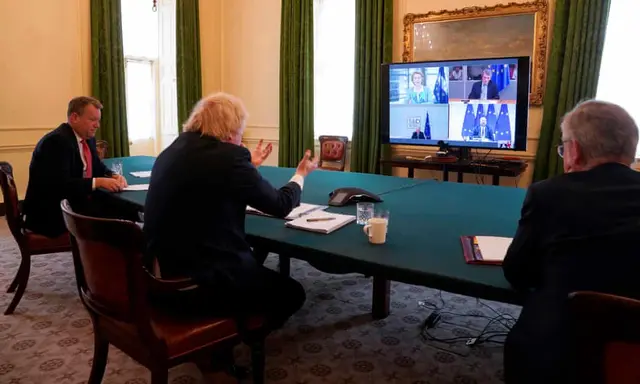Germany is urging the EU to draw up contingency plans for Brexit “no deal 2.0”, warning in an internal document that member states should not accede to British plans for a swift summer trade and security deal “at any price”.
Despite the most recent mood music around the negotiations being positive, there remain major sticking points to resolve and time is short after Boris Johnson confirmed that the transition period would not be extended.
The prime minister has said he believes a deal can be secured over the summer, but according to a leaked document obtained by Reuters the German government has earmarked September as the key month.
The German government document, dated 15 June, reads: “From September, the negotiations enter a hot phase. Britain is already escalating threats in Brussels, wants to settle as much as possible in the shortest possible time and hopes to achieve last-minute success in the negotiations.
“It is therefore important to preserve the unity of the 27, to continue to insist on parallel progress in all areas (overall package) and to make it clear that there will be no agreement at any price. Therefore, both national and European contingency planning would now have to start in order to be prepared for a no deal 2.0.”
EU officials believe the real deadline for a deal is 31 October, after which any deal would need to be ratified by the European parliament.
Agreement on “level playing field” conditions to ensure fair competition between British and EU businesses, access to UK fishing waters, police cooperation and dispute resolution are the main areas of contention.
There is also continued consternation in Brussels about the UK’s refusal to engage in talks on future security and defence cooperation.
Echoing the comments of the EU’s chief negotiator Michel Barnier earlier this month, when he complained that he did not “understand” the British position, the bloc’s ambassador to the UK, João Vale de Almeida, told Bloomberg said the member states remained open if Downing Street reconsidered.
“We put forward a proposal for the negotiating table, as we call them, on security and defence [and] foreign policy issues at large,” he said. “The UK has chosen not to open that table of discussion.”
Following a video conference meeting on Monday between Johnson and EU institution leaders including Ursula von der Leyen, the European commission president, both sides committed to “intensify” talks in July and if possible reach “an early understanding on the principles underlying any agreement”.
EU officials are as keen as Downing Street to secure early agreement, and the European council president, Charles Michel, will present the latest on the negotiations to leaders by video conference on Friday. But there remains some doubt in Brussels that common ground can be found within the next six weeks, as suggested by Johnson this week.
The EU drew up plans for a no-deal Brexit before the UK’s expected departure on 29 March 2019 covering areas ranging from customs checks to aviation to avoid the worst of the chaos that would have ensued.
“The situation is less serious than in 2019, as important regulations – for example, for citizens – were sorted out in the withdrawal agreement,” the German document reads.
(THE GUARDIAN)
 简体中文
简体中文













